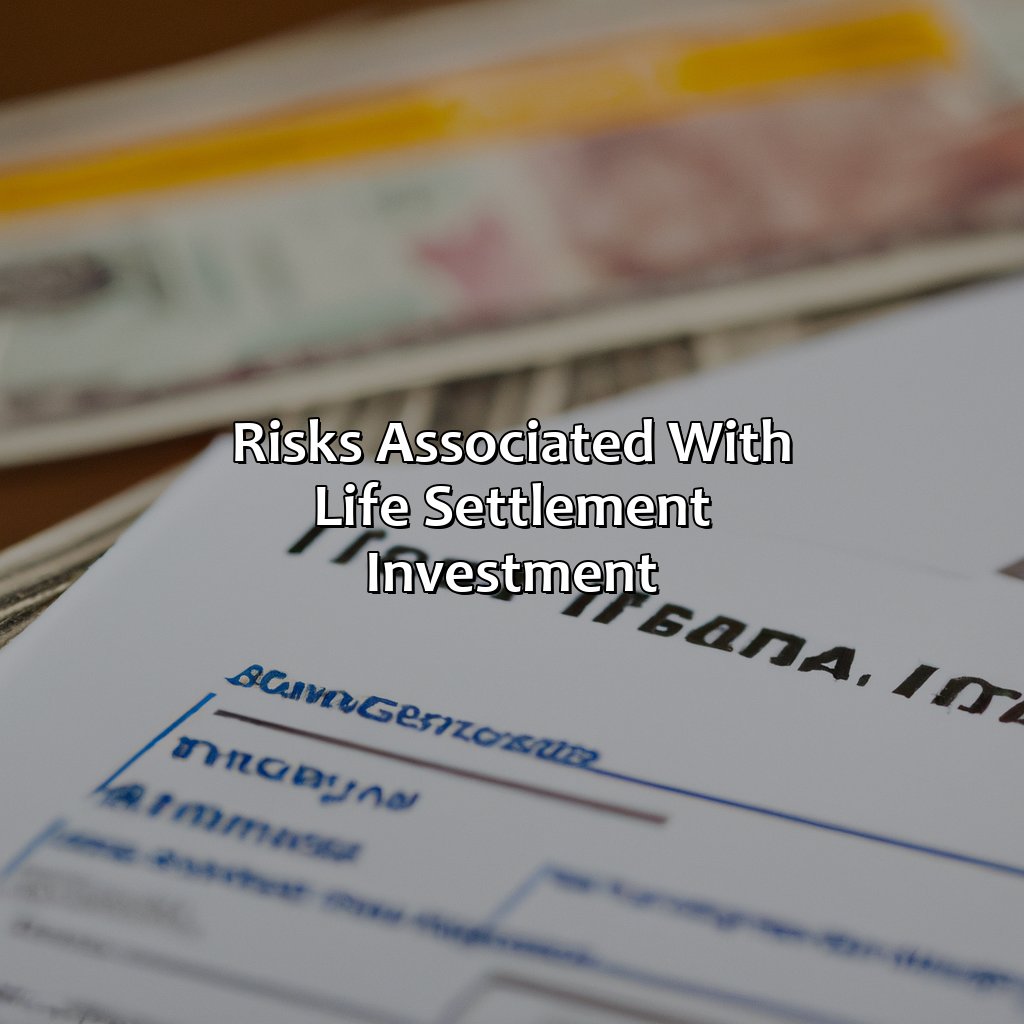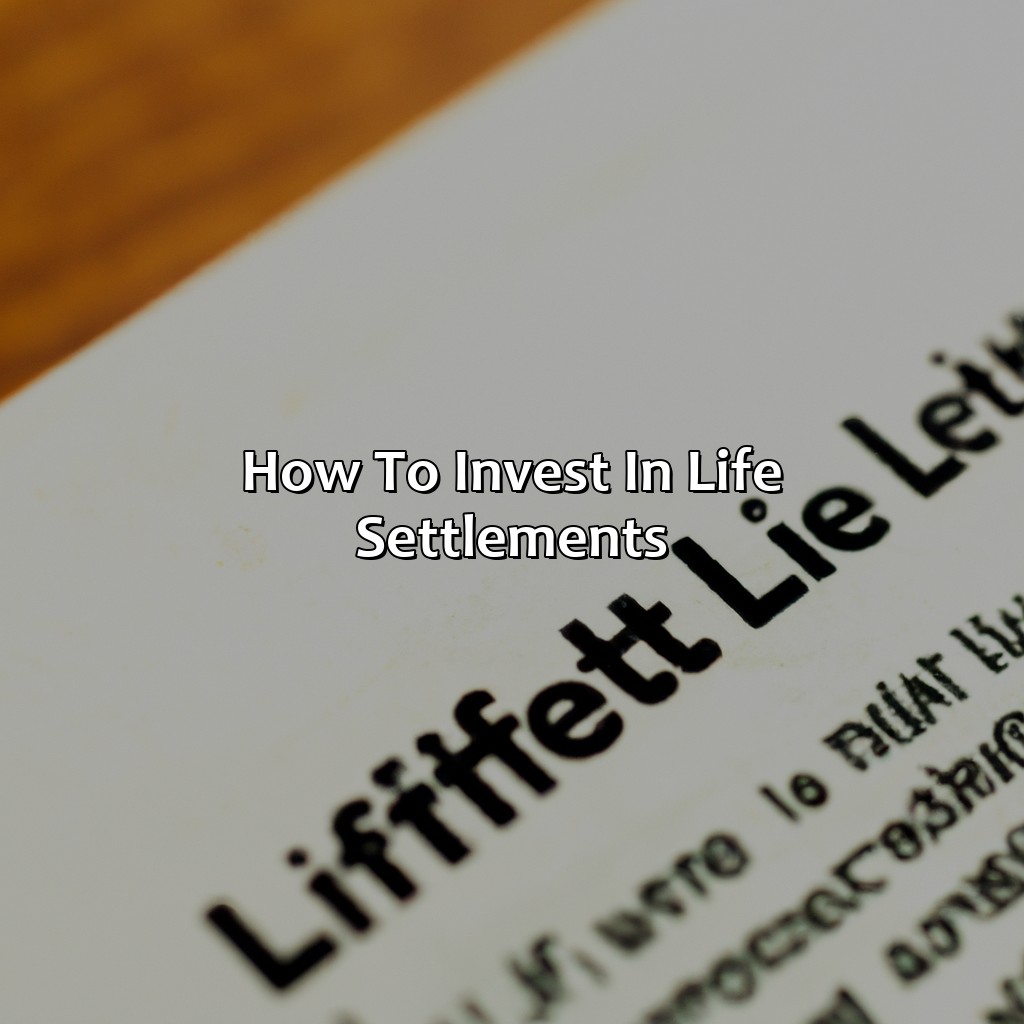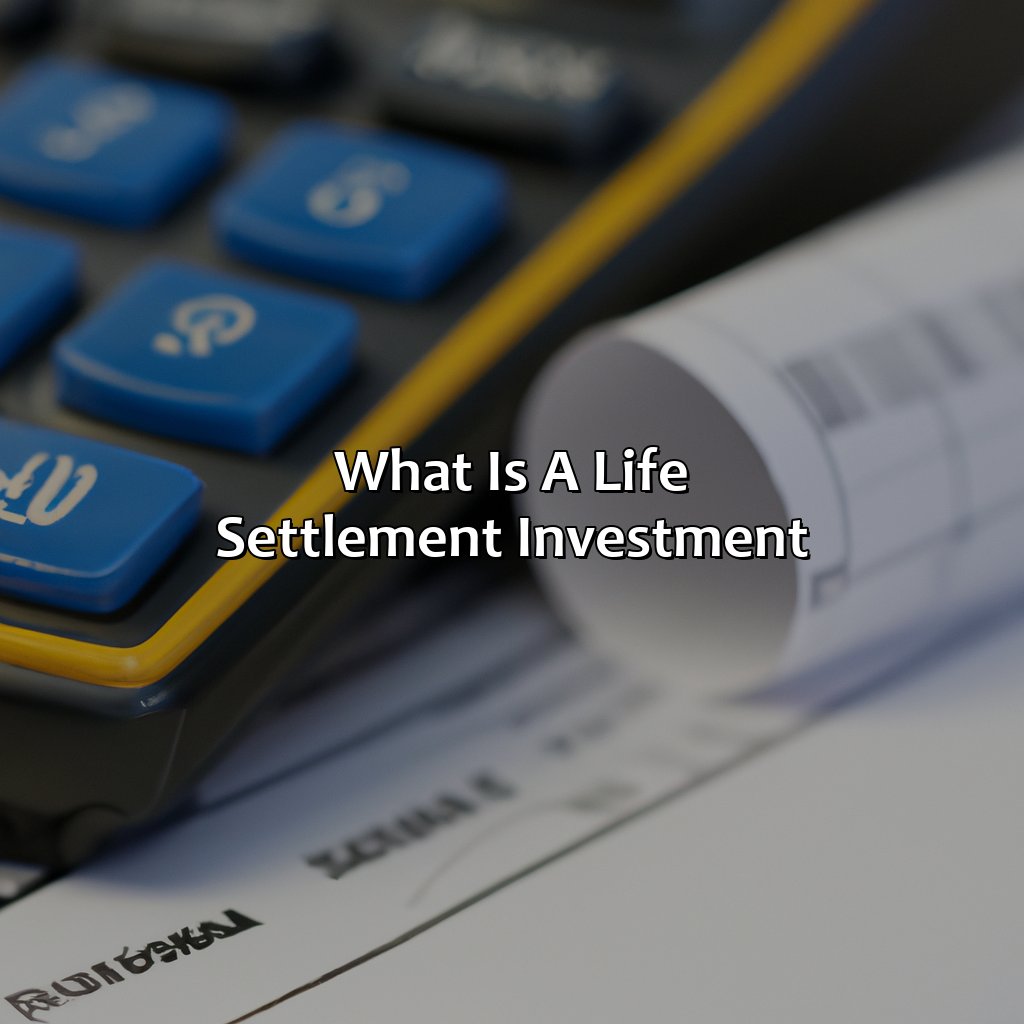What Is A Life Settlement Investment?
Key Takeaway:
- Life settlement investment is a financial strategy where investors purchase unwanted life insurance policies from policyholders, who are offered an upfront payment in exchange for the policy’s death benefit.
- The advantages of life settlement investment include financial gains for investors and beneficial outcomes for policyholders, who can use the funds to pay for medical expenses, long-term care, or other life goals.
- The risks associated with life settlement investment include uncertainty in life expectancy and regulatory risks, which can affect the profitability and legality of the investment.
- To invest in life settlements, one should find a qualified advisor and carefully analyze investment opportunities based on factors such as policy terms, insurance provider ratings, and medical underwriting.
Have you been looking into alternative investments for your retirement? If so, you may have come across life settlement investments. In this article, we’ll explore what life settlements are and the potential benefits they could offer.
Definition of Life Settlement Investment
Life Settlement Investment is a financial transaction where a life insurance policy is sold to a third party for an amount higher than its surrender value but lower than the expected death benefit. The settlement is generally made between the policy owner and the buyer with the involvement of a life settlement provider. This type of investment allows policyholders to extract value from their policies while still alive. The buyer of the policy will assume the responsibility of paying future premiums and will receive the death benefit upon the policy owner’s death.
In recent years, Life Settlement Investment has become a popular alternative investment opportunity for institutional investors such as hedge funds, pension funds, and private equity firms. The market is mainly driven by investors’ demand for higher returns with low-risk exposure. The value of the life settlement investment is based upon various factors such as the policyholder’s age, medical history, and life expectancy.
It is noteworthy that life settlements have stringent regulatory requirements that aim to protect both the policyholder and the investor. The industry is monitored by state insurance regulators, ensuring policyholders and investors’ safety. According to the Life Insurance Settlement Association, the average payout for a life settlement policy in 2020 was $539,797.
In an interview with Forbes, Scott Hawkins, the CEO of a life settlement provider, explained that “Life Settlements can be an excellent option for seniors who have life insurance policies they no longer need or can afford. In many cases, policies have been designated for the policyholder’s children or grandchildren, but sometimes the policy owner finds that their beneficiaries no longer need the funds, or their policy premiums may have become too costly.”

Image credits: retiregenz.com by James Arnold
Advantages of Life Settlement Investment
Maximizing your life settlement investment potential? Let’s explore the advantages.
Financial Gains for Investors and Benefits for Policyholders are the two main sub-sections. Knowing these benefits will help you make wise investment decisions that benefit both you and the policyholders.

Image credits: retiregenz.com by Harry Duncun
Financial Gains for Investors
Investors can generate profitable returns through life settlement investments. By purchasing a policy from a policyholder who needs liquidity, investors can earn significantly by selling off the same policy to firms looking for long-term income streams. Additionally, this type of investment boasts low risks due to the predictability of payouts and its stability in times of economic uncertainty.
What’s more, by investing in multiple policies instead of putting all eggs in one basket, investors can diversify their portfolio and minimize risks while maximizing financial gains.
Moreover, Life Settlement investments prove to be highly lucrative for investors who show patience as it is a long-term investment with nominal work required from them; however, they stand to get significant payoffs as policies mature.
One such example is Bob, an investor who bought several life insurance policies with a total face value of $30 million at an auction held by a reputable brokerage firm. Upon maturity, Bob sold these policies for $42 million—an impressive return on his initial investment. Thus, demonstrating how rationalizing the portfolio and allocating capital towards this type of investment route could provide considerable profit incentives.
Who said death doesn’t pay off? Policyholders can benefit from life settlement investments, turning their life insurance into something more than just a fancy obituary decoration.
Beneficial for Policyholders
Life settlement investment brings many benefits to the policyholders with policies they no longer need. It provides them with an opportunity to monetize their policy by selling it to a third-party investor for a lump sum. This is beneficial because it unlocks the hidden value of their policy, which they can then use for other purposes such as retirement income or long-term care expenses.
In addition, life settlement investment also helps policyholders avoid the financial burden of maintaining an unwanted policy. By selling their policy, they are able to free themselves from paying further premiums and eliminate any cash surrender values.
Furthermore, this investment option also gives them the ability to liquidate an asset that would otherwise be difficult to sell. This is especially true in cases where the policyholder has experienced changes in health status or age that made keeping the policy less attractive.
Pro Tip: Before considering a life settlement investment, seek advice from qualified professionals such as actuaries or financial advisors who can help evaluate and determine if it’s right for you.
You might get a great return on your life settlement investment, but don’t forget to double-check the expiration date on that policy.
Risks Associated with Life Settlement Investment
Know the risks of life settlement investments. Uncertainty comes from the life expectancy of the person. Also, be aware of the regulatory risks.

Image credits: retiregenz.com by Yuval Washington
Uncertainty in Life Expectancy
Life Expectancy Uncertainty arises when investing in life settlements as predicting the lifespan of a third party can be challenging. This risk is primarily associated with variables such as lifestyle, medical conditions, and genetics. There’s the possibility that it could be shorter or longer than predicted, leading to the investor receiving less or more than expected returns.
Investing in life settlement policies, which allow investors to purchase existing life insurance policies from policyholders at a discount, typically depends on the longevity and health status of policyholders. In general, people who sell their policies via settlements tend to have substantial health issues; therefore, it’s not easy to predict at what point they’ll pass away. In turn, this causes uncertainty for investors in determining their future payouts.
It’s important to note that some factors increase their uncertainty levels like viatical settlements involving terminally ill individuals whose time estimates are limited and straightforward. However, non-terminally ill third parties may lead to more extended observation periods resulting in higher possible uncertainties. Investors should weigh these risks against potential returns before investing their resources into life settlement policies.
To minimize the exposure to risk while investing in Life Settlements requires considering other critical variables related to policy liquidity or pricing and securing professional advice beforehand. A lack of preparation may result in an undesirable outcome that damages both your financial stability and emotional wellbeing.
Regulations are like guardrails, they keep you from driving off a cliff—but in the case of life settlement investments, they might just push you!
Regulatory Risks
Investors should be aware of the various rules and regulations that govern life settlement investments. Failure to comply with these regulations can result in significant penalties. Furthermore, any changes or modifications made to laws or regulations could also impact the overall value of an investment. Investors must conduct in-depth research on these regulatory risks before making any investment decisions.
A critical factor in regulatory risks is compliance with state and federal laws regarding the sale of life insurance policies. The Securities and Exchange Commission (SEC) also has specific rules surrounding life settlement investments that investors must adhere to strictly. Knowing and complying with these regulations can save investors from potential legal issues.
It’s worth noting that different states have varying rules and requirements surrounding life settlements, increasing the complexity of regulatory compliance. Because of this, it’s essential for investors to work alongside experienced professionals who understand these nuances and have a proven track record of success.
Ready to take a gamble on someone else’s life? Here’s how to invest in life settlements without losing your own shirt.
How to Invest in Life Settlements
Need help with life settlement investments? Get it from qualified advisors. This guide has the solutions! It’s called “How to Invest in Life Settlements” and has two parts. The first is “Finding a Qualified Advisor“. The second is “Analyzing Investment Opportunities“. With this info, you can make decisions based on your financial goals.

Image credits: retiregenz.com by Yuval Duncun
Finding a Qualified Advisor
To ensure a successful life settlement investment, it is crucial to find a qualified advisor with extensive knowledge and proven experience in the field. A knowledgeable advisor can provide valuable insight into the complexities of the life settlement market and help investors make informed decisions.
When searching for an advisor, consider their track record, credentials, and client reviews. Look for professionals with a thorough understanding of life insurance policies and regulations, as well as experience in appraising policies fairly.
It is important to note that not all financial advisors are equipped to navigate the nuanced world of life settlements. Be sure to seek out advisors who specialize in this area or have a team dedicated to handling these types of investments.
Finding a reliable advisor can alleviate stress and offer peace of mind when making investment decisions. Consider utilizing referrals from colleagues or consulting industry databases to narrow your search.
Investing in life settlements requires careful consideration and expert guidance. By finding a qualified advisor, investors can navigate this complex market more confidently and potentially maximize their returns. Get ready to crunch some numbers and dig through more paperwork than a tax auditor before investing in life settlements.
Analyzing Investment Opportunities
Investment opportunities require careful analysis to make the right decision. Understanding the risks and returns of various investment options enables investors to determine an appropriate strategy.
When it comes to analyzing life settlement investments, investors need to consider factors such as the policyholder’s age, health status, and life expectancy. Other important considerations include the insurance company’s reputation, the legal framework governing life settlements, and the potential return on investment.
Life settlement investments may provide attractive returns but are also subject to market risks and regulatory uncertainties. Therefore, it is crucial to conduct proper due diligence before investing in them.
To successfully navigate this process, investors can seek professional advice from financial advisors who specialize in life settlement investments or conduct their own research by reviewing available data.
Remember, making informed decisions requires thorough analysis of all possible factors and understanding of market conditions at any given time. Don’t miss out on opportunities but invest wisely for long-term success.
Five Facts About Life Settlement Investments:
A life settlement investment involves buying an existing life insurance policy from the policyholder at a discount. (Source: Investopedia)
Life settlement investments are typically sold to institutional investors or high net worth individuals. (Source: Forbes)
The potential returns on a life settlement investment can vary widely depending on factors such as the policyholder’s age, health status, and the terms of the policy. (Source: CNBC)
Life settlement investments are regulated at the state level and can be subject to complex legal and regulatory requirements. (Source: The Balance)
Critics of life settlement investments argue that they can exploit vulnerable seniors and lead to fraud, while proponents argue that they offer a valuable alternative investment option. (Source: The New York Times)
FAQs about What Is A Life Settlement Investment?
What is a life settlement investment?
A life settlement investment is when an individual purchases the life insurance policy of an elderly person and becomes the beneficiary of the policy. The investor receives a payout upon the death of the policyholder.
How does a life settlement investment work?
The investor purchases the life insurance policy of an elderly person for a lump sum payment, which is typically greater than the policy’s cash surrender value but less than the death benefit. The investor continues to pay the policy premiums and becomes the beneficiary of the policy. When the policyholder passes away, the investor receives the death benefit payout.
Who qualifies for a life settlement investment?
Life settlement investments are typically available to individuals who are over the age of 65 and have a life insurance policy with a face value of at least $100,000. The policyholder must also have an impaired or shortened life expectancy.
What are the benefits of a life settlement investment?
The main benefit of a life settlement investment is the potential for a high return on investment. Investors can earn significant returns compared to other low-risk investments. Additionally, policyholders may benefit from cashing in on their policy rather than allowing it to lapse or surrendering it for a lower amount.
What are the risks of a life settlement investment?
One risk of a life settlement investment is the potential for the policyholder to live longer than expected, which can result in additional premium payments and reduced returns. There is also the risk of the policyholder’s beneficiaries contesting the life settlement transaction. Additionally, life settlement investments are not regulated by the SEC and can be subject to scams and fraud.
Is a life settlement investment right for me?
Whether a life settlement investment is right for you will depend on your individual financial situation and investment goals. It is important to thoroughly research and understand the potential risks and rewards of a life settlement investment before investing. It is also recommended to consult with a financial advisor or attorney before making any investment decisions.
 Checkout this IRS Loophole
Checkout this IRS Loophole 
